On the train to Madrid today, I wondered: Can I still post on Dispatches from Donosti if I am no longer in Donosti, in fact, not even in Spain, or even Europe? Heading out on a trip that will take me almost 48 hours to get home, it occurred to me I could just change the name to Dispatches from Donosti and DC.
But all that would accomplish is a clever alliteration. Because DC and Donosti could not be more different, in so many ways. These last few days as I’ve organized and cleaned the flat, packed up my clothing and gifts to take home, and waded through the warm ocean waters at la Zurriola one last time, I’ve thought of everything I’ve loved about being in Donosti during the pandemic. I know it’s weird to associate “love” and “pandemic” because it’s been such a terrifying and horrible time for so many people, my family included, as my mom was diagnosed with Covid-19 back in April and has spent many weeks in isolation, as my brothers and I tried to get her health care from afar. Never mind all the people who have actually lost loved ones and/or their livelihoods.
But like many writers, I suspect, I was better equipped to ride this out than a lot of other people. For one, I am used to working at home and always have twenty projects I am working on so I did not have a lack of things to do. Second, I am used to not showering or seeing other people for days on end from when I go on writer’s retreats or am hunkering down on a project. This all felt normal and it was actually a bit fun to know that everyone else was doing it too. Third, with everyone at home, I no longer felt all the crazy FOMO I usually do when I have to turn down an invitation to something because I have to meet a deadline, and then I can’t stop thinking about all the fun I am missing. Fourth, I like a challenge, and though I wouldn’t have picked a global pandemic to inspire me to work on myself, being stranded in Spain I had to teach myself a few things, including: sharpening knives, navigating a foreign health system in Spanish (Public and Private), calling a plumber to explain a problem for which I had no vocabulary, working with an Armenian contractor whose Spanish was even weaker than mine, and many other tasks that required me to set aside my anxiety and plough on through. Then there was all that time we had to cultivate patience, (i.e. sourdough bread!)
Watching the vast greenery of the Basque Country give way to the flat, golden fields of Spain’s central plateau on the train today, reflecting on what these three months had been like for me, I had the sense that somehow, I had become a grown-up. Not that I wasn’t before, just that I was forced to prove to myself that I could do all these things I usually shunt off on my spouse, because it’s easier to do that than to face my own anxiety about doing those things that make me nervous. Like having to speak to a plumber in Spanish.
Facing anxiety is, I believe, one of the best gifts we can give ourselves and living through the pandemic–its scariest moments when Spain was leading the charge with number of new cases and deaths–forced me into those deep, dark places about death and dying. Some nights, lying in bed, worried that my latest headache was a sign I’d been infected with the virus, I would force myself to breathe deeply, and let myself be okay with that. If it’s my time to go, it’s my time, I would tell myself. Not that I felt ready to go, but even during non-pandemic times, so much is out of our control, even if we don’t acknowledge it. Recognizing and acknowledging that death could be around the corner at any moment actually freed me. It freed me from the constant worry that I had touched too many surfaces or that I had stood too close to someone. It freed me from that lingering and exhausting fear that something horrible was going to happen at any moment. Recognizing and confronting that panic was truly liberating as it allowed me to spend less time worrying, and more time being productive, writing, and reaching out to other people.
Managing my anxiety like this served me well on the train today too, when I boarded in Donosti and found that of the four people with seats in our carriage, three of us were within spitting distance–one right in front of me and the other across the aisle, while the rest of the car was empty, save for the one other fellow all the way in the back. It made no sense. Probably some Renfe algorithm had clustered people together to start to leave seats for big groups traveling together that might board later. When I asked the conductor if I could switch, she scolded me and said NO, because the seats had been disinfected and I’d already sat down.
How she thought my butt was going to infect another seat with covid I don’t understand but she was adamant. At that point, I had a choice. I could panic about the people way too close to me, or just remind myself that the incidence of the virus is very low in Spain and most people don’t have it. Instead of seeing everyone as a potential carrier, I try to see people as being healthy, to keep myself relaxed, while still practicing physical distancing.
Total and complete aside I also discovered a great trick for long distance traveling: You can attach your mask to your headphones and then put on your head phones like this. It’s great–totally avoids the ear pain.

Anyway, arriving to Madrid, same deal. The taxi driver had his mask below his nose for awhile, but there was a big plastic sheet between him and me, and again, even though it was Madrid, the epicenter of the pandemic in Spain, I reminded myself, there’s only 40-70 new cases a day in the WHOLE country right now.
Entering my hotel room was a bit weird. At my flat, I was quite used to the safe zone, my apartment, and the unsafe zone, i.e outside. What if my hotel room, the safe zone, wasn’t safe?
The hotel I’m at insists that they follow strict disinfecting protocols and probably they do, but what if some cleaner was in a bad mood? Or lazy, and missed some surfaces? Again, I had to reassure myself that probably wasn’t the case, and later in the day, I even went to a supermarket, where everyone was masked and doing a good job keeping distance. Stores had security guards limiting entry still, to keep crowding down as Madrid is one phase behind in the reopening. So staying focused on the positive, while being careful, seems to be the best way to cope at this point.
In Spanish, regresar means to return, while in English, regress means to go backwards; heading to the US, I truly feel that I am regressing, in both time and space. While the people of Spain have made unbelievable sacrifices–personal and economic–the hard work has paid off: they’ve been successful in getting the virus under control enough that they are planning to open their borders to the rest of Europe this weekend (except to the UK, due to a little tit for tat from a quarantine that the UK is imposing on visitors from Europe but the UK isn’t really Europe anymore, is it??). No one knows what will happen when everyone starts traveling again, but the epidemiological success here have been highly impressive. As mini outbreaks pop up, the system seems to be working: A recent rash of new infections in the Basque Country seems to have been brought under control due to testing, tracing and isolating cases.
Meanwhile, the US seems on a path of non-leadership and non-coordination at the federal level, at least until November. It’s heartbreaking to think of all the people in the US who have died, who didn’t have to die. I keep thinking, it didn’t have to be this way. So many countries besides Spain have worked so hard, like New Zealand, Taiwan and South Korea to get the virus under control, while in the US, the approach seems to be to just let people die.
And so heading home, back into that nightmare of having to return to stay-at home-orders, possibly indefinitely, right when things are opening up here in Spain, I felt a tremendous cognitive dissonance. On the one hand, I was happy to being going home to see my family, and my four legged pets, including this adorable fellow who I have not yet met:
But the dissonance was marked by sadness too, one that felt a little like my heart was breaking, that somehow I was being taken from something I loved. Of course, I first fell in love in Donsoti in 1985 with the guy I am still with, and I will alway associate this city with that love. And this trip, for the first time in all these years, I got to spend unlimited amounts of time with my mother-in-law and give back to her in a way that had not been possible before. I don’t expect I’ll ever get over the guilt of feeling like I somehow took something from her when her eldest decided to leave and come live with me in the states. (This particular feeling is nourished by the fact that she regularly tells me how she felt that day he left, watching him from the balcony, as he walked with his backpack to the train). This trip, assistng her with food, moving, electronics, all the day-to-day stuff she needs help with that we can never give her because we live so far away, and, her appreciation for my help, made me feel like something new passed between us, that she accepts me in a way now as someone who loves her and has been good to her son. Even if it did take 35 years!
The love I felt too also came from a community of women who folded me into their group. Most of these women know one another and I knew some of them, but during our time in confinement I got to know many more via Zoom book club meetings, happy hours, a picnic after we were allowed to gather, collaborations on this website, and via friends of friends. I felt embraced and cared for by this group, as most felt badly for me being stranded so far from home and were very kind about my situation. Truthfully, I never felt stranded. Just distanced. But none of them ever said, who are you, what are you doing here, they all simply accepted me. Through whatsapp we exchanged stories, fears, questions, recipes, sewing plans, jokes about Brad Pitt, clotheslines and pretty much everything. More than a few of them also reached out to me personally when things got very touch and go with my mother. For all of that I will be forever grateful.
Years on when people ask me, how did you manage the early days of the pandemic, what I will feel, and say, is that it felt like love and solidarity and collaboration, because even though there have been so many hard days too, those are the feelings that come forward, the ones I embrace. For many days I was worried that I would forever associate Donosti with confinement and fear; leaving today, seeing Donosti disappear in the proverbial rear view mirror, I suspect that the opposite will always be true.



This has brought tears to my eyes Diana. You have so accurately and openly given an insight into your past few months in Donosti. I’m glad to have had the chance to get to know you better and talk about literary and other things. Have a safe trip back to your family and “hasta la vuelta” xx
Thanks so much Krista, same to you, and thanks for all your wonderful contributions too. Keep them coming–I can dispatch from anywhere :).
Beautifully written Diana
Meaningful and poignant
Thank you, David. Nice to see you here! Maybe we’ll get a post from you one day:)
Bon voyage, ondo ibili, Diana.
Thanks Andy, good luck in Iparralde and keep the dispatches coming!
Besarkada bat, Diana + I hope you have a safe trip back home + we can have a coffee in Intxaurrondo next time you come. Thanks a lot for your dispatches!
Yes, for sure! I frequented Tribeka a lot once it opened. Thanks for all the great neighborhood recommendations!
Proud to have been part of the coterie. It’ll still be here when you’re back with us.
Thanks…it’s an amazing group!
Oops. That Anonymous above is me.
Aw, why’d you out yourself? Now I can’t refer to you as “anonymous” in all of our “escapades” I plan to write about 🙂
Beautiful. Thanks for your writing Diana, and good luck with your stateside adventures. Ikusi arte.
Thanks…enjoy the summer!!